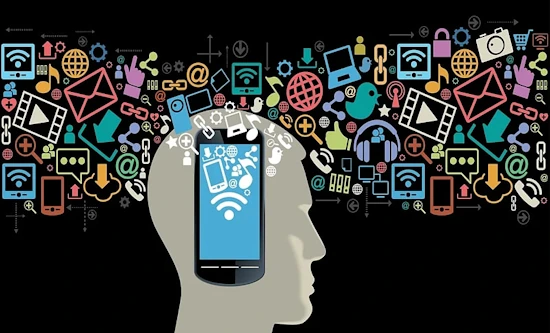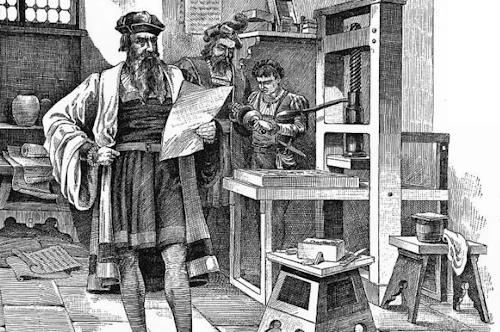
Today’s society is characterized by a global interconnectedness that has arisen thanks to the Web, technological advancement and socio-economic ties. We can communicate with people on the other side of the planet in real time; moreover, modern means of transportation have shortened time, making it easier to move goods and people. In this world, people are able to relate to others more easily, and this is unquestionable; however, a disturbing question arises: why is it that we sometimes feel so alienated? In this article, we will discuss some aspects of contemporary lifestyle and the psychological effects they induce in people, but not before providing the historical background that laid the foundation for Western society. For the sake of brevity, we will only consider the perspective of the Western world, but there would be much more to say about other cultures and historical traditions.
The connection in history
Nowadays, one is probably led to think that in the past it was difficult to travel and communicate with people who lived in other states, if not in other cities. Nothing could be more wrong; in fact, since ancient times, human beings have been undertaking journeys, both by sea and land, with the intention of finding new lands in which to settle, trade routes and relations with other civilizations. Even then, there was a bond between peoples, who were able to communicate without the internet or other complex technological means.
Empires as a union of peoples
The earliest examples of an interconnected and globalized world, limiting us to the West, were the empires established by Greek civilization first and Roman civilization later. These institutions came into being, following numerous wars and bloody conflicts, with the intent to expand their power, accumulate wealth and find new markets. Although the intentions were purely materialistic, they also had positive effects, such as bringing different cultures together and sharing knowledge and traditions that would otherwise have been relegated to a small section of the population. Think of the Arab conquests in Europe during the Middle Ages that brought extraordinary works of art and knowledge.
The origins of the globalized world
A prototype of globalization was present as early as the 1500s; following the discovery of America, an intercontinental market for goods and slaves was initiated. But it was not until the second half of the 19th century that what we currently call globalization occurred. This term indicates a process of integrating economic relations on a global scale and an increasing dependence of national markets on international ones. Thus, in the late 19th century, the first globalization of a modern kind took place thanks to the technological developments of the industrial revolution and transportation. It thereby became possible to exchange more goods in less time and, for workers, to move to increasingly distant locations.
Conflicts and globalization
The two world wars of the last century limited such globalization, which resumed in the 1950s with the world divided into two blocks, which then disappeared in the 1990s with the collapse of the Soviet Union. The USSR, i.e., the Union of Soviet Socialist Republics, acted as a brake on the advance of globalization even though it was also fully in favor of unrestricted technological development: evidence of which was the race to space that saw it compete with the United States.
Contemporary globalization
An international economy makes it possible to use raw materials that are not available in a given territory, to have a large number of goods from all over the world, and to lower production costs so as to obtain cheaper products. But not everyone has always been in favor of globalization: in the last decade of the 20th century and in the early years of the 21st century there were movements, such as the so-called no-globals, that opposed it, accusing multinational corporations of exploiting labor, including child labor, in backward countries, polluting the environment, limiting the sovereignty and autonomy of local institutions, and fostering wars.
Information-technology globalization
Today, globalization affects not only the economic field but also the fields of information and media. Tools such as the Internet have made it possible to break down national borders and to communicate and spread news everywhere. However, the international telematic network also produces negative effects, such as the excess of information, which is not always accurate, and the exposure of inappropriate content to minors. For this reason, its conscious and sustainable use is necessary.
International Relations and Technology
Technological development would not have been possible in a closed society without exchanges. For example, Johannes Gutenberg most likely could not have introduced printing to the West in 1455 if he had not had the paper invented in China in 105. Galileo Galilei, in 1609, succeeded in building the first telescope thanks to scholars who had previously analyzed how lenses worked.

The discoveries behind technological devices
Many current discoveries and technological tools of everyday use arise precisely from the interaction between inventors originating from different places, from the rediscovery of technologies that had fallen into oblivion, as well as from the merging of various innovations that arose for different purposes.
Without the help of the “telettrofono” invented in 1854 by Antonio Meucci, Alexander Graham Bell might not have succeeded 12 years later in patenting the telephone. And, if it were not for the invention of microchips in 1958 thanks to Jack Kilby, neither computers nor smartphones could have been created. These objects, which seem to have become unavoidable today, come precisely from the fusion of numerous ancient and modern technologies.
Speed and the concept of traveling
The automobile, an indispensable means of transportation for many, changed mankind’s way of life from its birth in the late 1800s. Distances that used to be very long and reachable after days of travel now take a few hours. Considerable savings in time and energy, sure, but at what cost? Not only in environmental terms, that is, due to the pollution produced by more than a billion cars through the burning of hydrocarbons and the disposal of their batteries, but also in the way cities and mobility are experienced. Once upon a time, long journeys were extraordinary experiences, lived as true adventures; think of the works of travel literature such as Homer’s Odyssey or The Travels of Marco Polo. Travel was sometimes perceived as a spiritual experience, in fact many went on pilgrimages to places of worship with the intention of getting closer to God, while others visited a variety of nations with the purpose of discovering new cultures and increasing their awareness. Today, travel is only seen as a function of the time it takes to get from point A to point B, with no enjoyment of taking a break at some local place to get to know the local people or delicacies, thus enriching one’s cultural background.
The automobile: an early example of totalizing technology
Not only did the concept of travel change, but also the concept of cities. Once upon a time, urban settlements were designed for people’s activities and lives; people could walk leisurely and children could play without danger. Today, on the other hand, built-up areas are a tangle of streets on which cars circulate overbearingly at all hours, of squares turned into parking lots, of alleys that were once pedestrian-only become narrow hovels without sidewalks. This is especially the case in Europe, where narrow streets built in ancient times for the passage of people and small carts have been opened to motor vehicles, with no possibility for people to walk or bike along them safely. We fill our mouths with rhetoric focused on respect, inclusiveness, and equity, but we not infrequently get the feeling that the law of the jungle is still the basis of human action. However, this is not the case everywhere, for example, many Spanish cities are designed to allow everyone to use them, wide multi-lane roads are lined with very wide sidewalks and bike lanes. Here, the street is designed as a whole to be a place of passage and meeting, for all users and not just those who ride on four-wheelers or more.

Technology in modern society
Technological tools that used to help human beings only in certain activities, for example, the telephone only when one needed to contact a person or the computer when one needed to work on a large amount of data, now permeate every single moment of life. This pushes people to live with their devices always at hand, not realizing that the same activities could be carried out in even more practical and efficient manners if one only remembered how to do it.
Smartphone life: friends, likes and followers
It is increasingly common to walk down the street and see people immersed in their devices, observing reality through a screen without noticing what is going on around them instead (including dangers). Until a few years ago, for example, when traveling on public transportation, one would see people reading books or newspapers, conversing with each other, and looking out the window, while today the majority of them are literally absorbed by smartphones. What causes them to do this? Many claim that they do it to stay informed about what is happening in the world and to contact friends. One might wonder how they interpret human relationships; for them, does having a friend mean sharing posts and likes on social media, texting them hastily, or calling them at odd times of the day while distracted by other activities?
Interpersonal relationships today
Not only the digital natives, who have never experienced a different world, but also more mature people seem to prefer virtual interactions to face-to-face encounters, so much so that when they even meet with acquaintances, they cannot tear themselves away from the phone, frequently abandoning the conversation to check what is happening online, as if the person in front of them were the real distraction. Many seem to no longer value those real relationships, born out of deep knowledge of each other, dialogues and discussions and vis-a-vis confrontation, in which it was possible to communicate even through just a glance or a gesture. So “caught up” in virtuality that they no longer remember what it was like before, when one was not connected and reachable all the time and real effort was needed to have a conversation with someone.
Living or sharing?
While once upon a time people did not own cell phones and were not available 24 hours a day, but only at certain times, today, because of these, they are always connected to the Internet. The majority spend time absentmindedly scrolling through what is happening on social networks, in turn sharing photos or thoughts of their daily lives. This insane need to share and showcase oneself with the goal of gaining the approval of others or triggering envy distracts people from the present moment and prevents them from enjoying it to the fullest with maximum intensity, without interruption. Think about it, the truly special and unforgettable moments do not need photos or anything else so that they remain indelible in our memory.

Love in the Time of Smartphone
Many individuals today take advantage of technological devices to build new relationships and make new friends, through the use of chats and apps, because they think this is the easiest method. Entertaining relationships filtered by a screen and intermittently depending on their availability is not a healthy way to experience them, as we lose both the spontaneity and the overwhelming emotions we experience when confronted with a person who sparks our interest. Despite this, many young people prefer virtual relationships even though they lead them to conduct an alienating existence, which paradoxically goes so far as to make them feel lonely even though they are always connected.
Pandemic and technology
Especially since 2020, as a result of the covid-19 pandemic, people have begun to live in a bubble, fearing contact and confrontation with others. This disposition was already present in them; in fact, digitization was already prevailing before that date and the tendency to live on social media was fast catching on, but this event kicked off its ultimate realization, manifesting the negative effect of being always connected in all its power.
In virtual life: lions; in real life: sheeps
Individuals who previously sought to be friends with everyone, sharing experiences, thoughts, and wanting to be part of a community, or rather a herd, during the pandemic showed their dark side. Thanks to the protection provided by the technological medium and the impossibility of direct and presential confrontation, they turned into accusers, censors and delators, aggressively pointing out as enemies anyone who thought differently.
Strong with the weak, weak with the strong
From sheep to wolf, but still part of a herd or flock.
Social media has the ability to stimulate ancestral psychological dynamics that make us similar to members of a herd or flock, while managing to extinguish individuality and critical thinking. That false sense of security generated by feeling part of a larger, albeit virtual, group, seems to bring out the worst in people, forcing us to reflect more deeply on the true meaning and usefulness of these sharing tools.
The fear of the stranger and the little virtual world
Although the pandemic is now a distant memory, people continue to look at each other with distrust, afraid of strangers who could infect and harm them. Generalized distrust is rampant, and exchanging a word with someone on the street, or a smile, is becoming nearly impossible. Technology and fear together have caged human beings even more in an illusory bubble in which there is only what you want to see: everything else is simply not there, or you willfully ignore it, perhaps even taking pride in your ignorance. Yes, because social media and smartphones, an inseparable pair, spur anyone to voice their opinion, even where it is not requested.

One’s role in society
People prefer to live an imaginary life, which starts in the real world but extends into virtuality; all this to present a better self-image and take advantage of technology to carve out a different role from the one society has given them. This phenomenon is an obvious sign of dissatisfaction and the inability to create an existence based on sound principles and personal moral values, as people prefer to choose those of the community, even if they do not perceive them to be authentic. No matter how much people want to conform to certain dogmas imposed by the community, they will always retain within themselves a certain uniqueness. Certain dreams and ambitions simply cannot find approval from the majority, representing the essence of our individuality and way of being. Seeking the constant approval of the public ends up trivializing and unifying everything, for better and especially for worse.
Conclusion
In this examination, we have broadly illustrated the change that technology has brought to today’s society by comparing certain aspects, such as international relations, communication and travel, in the lives of ancient and contemporary people. It turns out that while technological tools used to help people only in certain occupations, today such modernized tools have made their users totally dependent on them, making the idea of living without them unthinkable. Digitization has created a more agile and seemingly smaller world, facilitating both the spheres of communication and commerce, but at the same time it has created a paradox, making people feel alienated despite always being connected and in touch with everyone.
Individuals should make conscious use of technology, letting it remain a mere tool in their hands and preventing it from replacing their will. The moment that algorithms guide human choices and behavior, technology is no longer a means, but rather an existential end. The philosopher Immanuel Kant advocated the idea that humanity should always maintain a central role and be treated as an end, never a means. Perhaps the thinkers of the past could not take advantage of the potential offered by the internet and smartphones, but they were certainly not naive and understood human nature much better than those who, today, rely on wikipedia or facebook for answers.
So, what kind of relationship do you have with technology and progress? Could you do without it even for a day? Or are you totally immersed in the outer world and its illusions? Find out with our unique, in-depth and serious personality tests.
TAKE THE AWARENESS TEST
TAKE THE AWAKENING TEST
TAKE THE GREAT PERSONALITY TEST
If you are under 16, we also recommend you to try the Youth Wisdom Test to check your maturity level.
MINI SELF-ASSESSMENT TEST: ARE YOU A TECH ADDICT?
Read the sentences below and select the ones you agree with and that you think make the most sense.
Count the number of boxes checked and read the corresponding profile.
0: You are by no means a tech addict
1-2: You are hardly a tech addict
3-4: You are quite a tech addict
5-6: You are totally a tech addict
